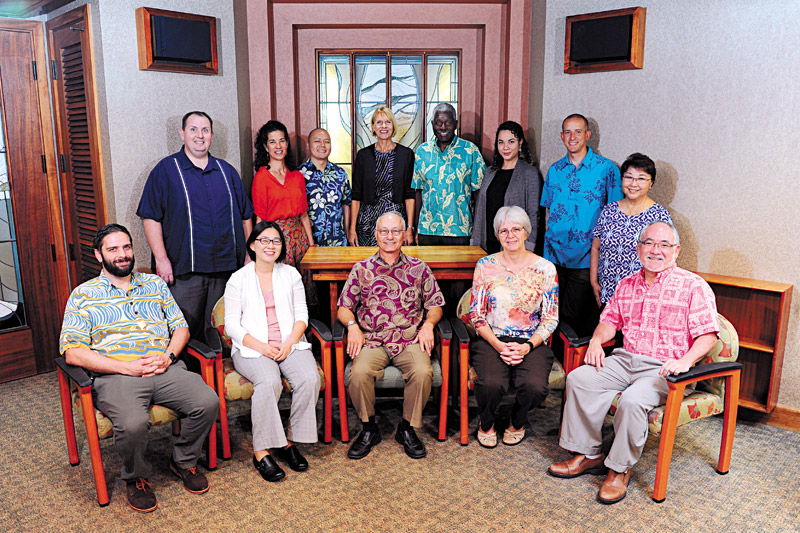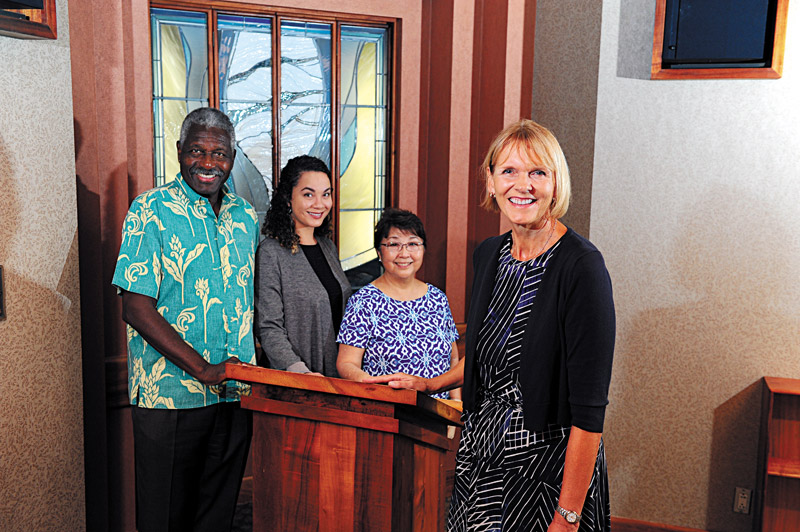Healers Of The Human Spirit

Ministry chaplains of Pacific Health Ministry are: (front row, left to right) Steven Stitely, Bora Kim, Charles Card, Phyllis Hormann and Nathan Kohashi; (back row) and Scott Berggren, Puanani Lalakea, Thomas Hong, Anke Flohr, Al Miles, Lena Ann Keanu- Reichel, Charles Card and Gail Sugimoto-Leong.
For three decades, interfaith members of Pacific Health Ministry have dutifully roamed the halls of hospitals and nursing homes, blessing the lives of those in need of comfort and healing.
The power of prayer is exalted in spiritual healing. But what about the power of presence? Can consoling someone in a depressed mental or physical state be done by merely being present? Is there something magical and comforting about someone being at one’s bedside?
No one knows better about the power of presence than those in the specialized field of clinical pastoral ministry. In the halls of medical centers, hospitals, nursing homes and hospice care is a stealthy and quiet army of inspiration made up of valued members of a care team.
To find out more about these dedicated individuals and how one gets into the profession of divine intervention, we visit Pacific Health Ministry at 1245 Young St. The local organization is observing 30 years of spiritual care to Hawai‘i’s most fragile and health-challenged patients and their families.
We want to find out about healers of the human spirit and how the power of presence works with modern medicine to serve humanity. It is particularly timely to explore hospital ministry as America observes National Hospice and Palliative Care Month in November.

Chaplains from Pacific Health Ministry who provide spiritual care include (from left) Al Miles, Lena Ann Keanu- Reichel, Gail Sugimoto-Leong and Anke Flohr.
You say you haven’t heard of Pacific Health Ministry?
The ministry of presence is like that. It works in spiritually miraculous ways, letting medical providers do what’s best for the body while clinical pastoral ministers administer to the soul.
It’s a holistic trinity of body, mind and spirit.
INTERFAITH DIVERSITY
Most notably, Pacific Health Ministry carries out its mission in a realm of interfaith diversity and culture convergence.
According to Pew Research Center, Hawai‘i’s religion rainbow spans Christians (63 percent), non-Christians (10 percent, of which 8 percent is Buddhist), non-affiliated religion (26 percent atheists, agnostic), and undeclared (1 percent).
Yet how are spiritual leaders like Pacific Health Ministry adjusting to a society that’s becoming increasingly nonreligious?
Pew Research reports a rise of the “religious none.” A larger portion of the nation’s population is religiously unaffiliated, jumping up 7 percent from 2007 to 2014.
It’s natural to associate religion with traditional worship. But the ministry’s executive director, the Rev. Anke Flohr, reminds us that “religion is only one of many expressions of spirituality. Many spiritual care practitioners are employed by secular organizations such as hospitals, schools, military, police and fire departments, and correctional institutions.”
So many times patients and family members just want to be heard. At those times, we are present and support them the best we can.
“The spiritual dimension of ideas, beliefs, values and ethics plays a significant part in one’s quality of life,” Flohr says.
At 11 health care facilities on O‘ahu, Maui and Kaua‘i, Pacific Health Ministry-trained and accredited practitioners are integrated into medical care teams. As the health care and spiritual landscape changes (due to changing demographics, including aging populations), the need for spiritual care practitioners will increase.
The ministry’s pioneering leadership, established protocols and decades of experience will show Hawai‘i’s way to enlightenment.
Let’s meet four ministry chaplains who provide wisdom and insight. They are Al Miles of The Queen’s Medical Center, Gail Sugimoto-Leong of Kuakini Medical Center, Lena Ann Keanu-Reichel of Pali Momi Medical Center, and Flohr.
Pacific Health Ministry began services on O‘ahu in 1988 with three major health care institutions: Kapi‘olani Medical Center for Women & Children, The Queen’s Medical Center and Kuakini Medical Center. Since that time, programs have been established at Hawai‘i State Hospital, Kaiser Foundation Hospitals, Pali Momi Medical Center, Maui Memorial Medical Center, Pōhai Nani Good Samaritan and Straub Clinic & Hospital.
These forward-thinking organizations have benefitted from integration of spiritual leadership and the nationally accredited clinical pastoral education that the ministry provides.
“It started at Kuakini Medical Center with a group of local clergy and physicians taking care of patients in the oncology unit,” Flohr recalls. “They realized a need for spiritual care beyond those suffering from cancer. They wanted to integrate a holistic approach to health care as well as provide support for more patients and families.
“That got the ball rolling,” she adds. “It is not just calling in clergy when someone dies.”
Sugimoto-Leong is one of the original Pacific Health Ministry members and a graduate of its first chaplaincy class. Today, she is one of 18 chaplains on the ministry’s team.
“I started with the Rev. Kikuo Matsukawa, chaplain at Hawai‘i State Hospital and the first clinical pastoral education supervisor in Hawai‘i,” she says. “He and the Rev. Glenn Harada sprouted the seeds of Interfaith Ministries of Hawai‘i (later renamed Pacific Health Ministry) in the late 1980s.”
Miles, who authored a book about the organization’s first 20 years, tells of its formal establishment.
“Pacific Health Ministry was incorporated as a nonprofit in 1986,” he recounts. “We enrolled our first pastoral education student in1988. The same year, we received accreditation from the Association for Clinical Pastoral Education and have been conducting classes ever since.”
Pacific Health Ministry is the only accredited graduate-level ministry education program in the state. More than 700 clergy, pastoral ministers and theological students from over 30 countries have participated to date in the program. Students complete about 300 supervised clinical hours and 100 hours of structured class and individual education in an 11to 12-week program mandated by the ACPE, according to Flohr, a certified CPE educator.
This means that the organization’s chaplains come from well-honed education and training that follows an action-reflection-action model. This is not volunteerism but a special corps of divinity professionals whose skills bring calm, communication and compassion to those who are suffering and coping with illness.
A critical role, Miles points out, is offering spiritual counsel to health care providers, such as physicians, nurses and medical staff, who deal with human frailty and mortality every day.
“The well-being and emotional stability of staff affect the well-being of those they serve,” he says.
Keanu-Reichel, the newest chaplain, validates, “We are human. Emotion is part of the equation, and we must be able to compartmentalize our feelings when necessary. But empathy can be conveyed in verbal and non-verbal ways.
“Listening is essential,” she continues. “I do my best to ask the right questions. So many times patients and family members just want to be heard. At those times, we are present and support them the best we can.”
Sugimoto-Leong emphasizes the value of sharing, saying, “I am grateful for learning about different cultures. I learn so much from elders at Kuakini. They tell powerful stories. There is reciprocal enrichment.”
As Flohr professes, “The most teachable moments in our lives are those in which we are most vulnerable. When sickness comes, most people talk to their doctor and God.”
Almost nine in 10 Americans turn to prayer for healing, according to a study published by the Journal of Religion and Health.
Chaplains say one cannot eliminate sorrow. The Bible is not a Band-Aid, they claim. They share emotion, and by sharing it, they lighten the load. The ministry of presence is said to be a way of being rather than a way of doing or telling.
“It’s holding space in a conscious act of being present, open and protective of what another needs in the moment,” explains Flohr.
“We set aside personal emotions at the door,” Miles adds.
Dealing with a diversity of faiths, their work does not involve converting one’s belief and religion.
Instead they fill a vital need in dealing with death and grief, palliative care, health care ethics, hospice care and bereavement, personal and professional boundaries, and spirituality. They also are in the community in times of disaster and train lay volunteers.
Hospital ministry is a specialized field that will flourish as our aging population fills retirement communities, nursing facilities, assisted living units and hospice centers.
As those community safety nets materialize, Pacific Health Ministry will draw upon its three decades of stability and experience in the Pacific to prepare the next generation of spiritual care chaplains.
As Kuakini Medical Center president-CEO Gary Kajiwara puts it, “Kuakini has enjoyed a successful 30-year partnership with the Pacific Health Ministry. We are grateful for the years of service that the assigned chaplains have provided to our patients and their families. The chaplains are an integral part of Kuakini’s health care team in supporting the emotional and spiritual well-being of patients and enhancing the quality of care at our medical center.”
Ministry is the means by which one serves faith and the community. If the power of presence is one’s calling, the answer might be in hospital ministry and clinical pastoral education. Divine intervention is a blessing.





